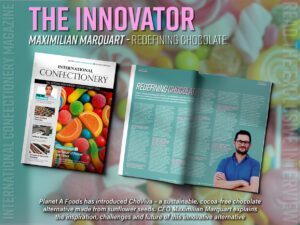By Clay Gordon, Technical Editor of International Confectionery Magazine.
Back in November 2018, Barry Callebaut (Switzerland) petitioned the US Food & Drug Administration (“FDA”) for permission to make a qualified health claim (“QHC”) for certain cocoa products containing high levels of flavanols. These QHCs would be used on the labels and marketing of conventional foods. BC proposed:
“Supportive but inconclusive scientific evidence suggests that consuming at least 200 mg of cocoa flavanols daily, such as provided by high flavanol cocoa powder, or high flavanol semisweet or high flavanol dark chocolate, may reduce the risk of cardiovascular disease. This product contains at least 200 mg cocoa flavanols per serving.”
(The QHC language above reflects an update to the petition dated August 30, 2019. A conventional food, according to the FDA, is one that is consumed for its taste, aroma, and nutritional value. Cocoa powder and milk chocolate are considered conventional foods. Capsules containing cocoa flavanols would be considered dietary supplements.)
On February 1st, 2023 the FDA published its response to BC’s petition. (The 27-page decision letter can be downloaded from: https://www.fda.gov/media/165090/download.) In their response, the FDA did not give “approval” to the language BC proposed in the updated 2019 petition.
It’s important to understand that a QHC is a statement of the wording of a claim the FDA will not object to. A company must use the specific language of the QHC or not make the claim at all. The final forms of this QHC are:
1) “Cocoa flavanols in high flavanol cocoa powder may reduce the risk of cardiovascular disease, although FDA has concluded that there is very limited scientific evidence for this claim.”
2) “Cocoa flavanols in high flavanol cocoa powder may reduce the risk of cardiovascular disease. FDA has concluded that there is very limited scientific evidence for this claim.”
3) “Very limited scientific evidence suggests that consuming cocoa flavanols in high flavanol cocoa powder, which contains at least 4% of naturally conserved cocoa flavanols, may reduce the risk of cardiovascular disease.”
4) “Very limited scientific evidence suggests that consuming cocoa flavanols in high flavanol cocoa powder, which contains at least 4% of naturally conserved cocoa flavanols, may reduce the risk of cardiovascular disease. This product contains at least 4% of naturally conserved cocoa flavanols.”
So … Is this the Major Breakthrough BC have claimed and other media outlets have reported without question?
Observing that the QHC can be applied only to high flavanol cocoa powders – no claim can be made of chocolate – BC was rebuffed at midfield. “May reduce risk” is not a ringing endorsement and it definitely does not mean “heart healthy,” even if some marketing departments will want consumers to interpret it that way. Technically, there may be some ambiguity over the question of whether or not alkalized cocoa powders can be fortified with flavanol extracts and qualify as “high flavanol.” (So, yes, probably. Much hinges on the meaning of “naturally conserved.”)
I predict we have not heard the last word on these topics, but at least you know the scope and limits of this ruling, and questions to consider when you do encounter one or more of the claims.
Stay up-to-date on the latest industry news and exclusives in our magazine.
Never miss a story… Follow us on:
![]() International Confectionery
International Confectionery
![]() @InConfectionery
@InConfectionery
![]() @InConfectionery
@InConfectionery
Media contact
Caitlin Gittins
Editor, International Confectionery
Tel: +44 (0) 1622 823 920
Email: [email protected]









